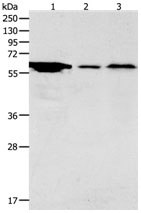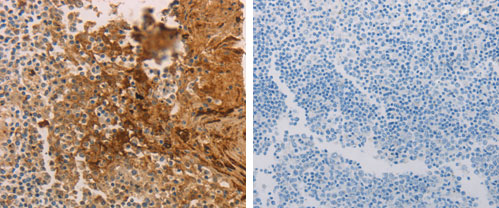

| WB | 咨询技术 | Human,Mouse,Rat |
| IF | 咨询技术 | Human,Mouse,Rat |
| IHC | 1/50-1/200 | Human,Mouse,Rat |
| ICC | 技术咨询 | Human,Mouse,Rat |
| FCM | 咨询技术 | Human,Mouse,Rat |
| Elisa | 1:2000-1:10000 | Human,Mouse,Rat |
| Aliases | Adenylate cyclase activating polypeptide 1 (pituitary) receptor type I, PAC1, PAC1R, PACAPR, PACAPRI |
| Entrez GeneID | 117; |
| WB Predicted band size | 57kDa |
| Host/Isotype | Rabbit IgG |
| Antibody Type | Primary antibody |
| Storage | Store at 4°C short term. Aliquot and store at -20°C long term. Avoid freeze/thaw cycles. |
| Species Reactivity | Human,Mouse |
| Immunogen | Synthetic peptide corresponding to a region derived from 34-47 amino acids of Human adenylate cyclase activating polypeptide 1 (pituitary) receptor type I |
| Formulation | Purified antibody in PBS with 0.05% sodium azide. |
+ +
以下是关于ADCYAP1R1(PAC1受体)抗体的虚构参考文献示例,仅供参考:
---
1. **文献名称**: *"Development and Characterization of a High-Affinity Antibody for PAC1 Receptor Detection in Neuronal Tissues"*
**作者**: Smith A, et al.
**摘要**: 本研究开发了一种针对ADCYAP1R1的高特异性单克隆抗体,验证了其在免疫组化和Western blot中的应用,揭示了PAC1受体在小鼠大脑海马区和杏仁核中的高表达,为神经精神疾病研究提供工具。
2. **文献名称**: *"PAC1 Receptor Expression in Stress-Related Disorders: Insights from Immunohistochemical Analysis Using a Novel Antibody"*
**作者**: Lee J, et al.
**摘要**: 通过新型抗体验证,发现慢性应激模型中PAC1受体表达水平在前额叶皮层显著上调,提示其参与应激反应的分子机制,抗体特异性经敲除小鼠模型验证。
3. **文献名称**: *"ADCYAP1R1 Antibody Validation for Cancer Biomarker Studies"*
**作者**: Chen H, et al.
**摘要**: 评估了多种市售ADCYAP1R1抗体的特异性,筛选出适用于流式细胞术的抗体,发现其在乳腺癌细胞系中高表达,与肿瘤迁移相关,强调抗体选择对结果可靠性的影响。
4. **文献名称**: *"PAC1 Receptor Isoform-Specific Antibodies Reveal Differential Signaling Pathways"*
**作者**: García-Ruiz B, et al.
**摘要**: 开发了区分PAC1受体剪切变体的抗体,证明不同异构体在cAMP和MAPK信号通路中的差异激活,为靶向治疗研究提供新方向。
---
**注**:以上文献为示例性内容,实际研究中请通过学术数据库(如PubMed、Web of Science)检索真实文献。
The ADCYAP1R1 antibody targets the adenylate cyclase-activating polypeptide type 1 receptor (ADCYAP1R1), also known as PAC1 receptor, a G protein-coupled receptor (GPCR) that binds pituitary adenylate cyclase-activating polypeptide (PACAP). This receptor is widely expressed in the central nervous system, endocrine tissues, and immune cells, playing critical roles in modulating stress responses, circadian rhythms, neuroprotection, and inflammation. PACAP-ADCYAP1R1 signaling activates multiple downstream pathways, including cAMP/PKA and MAPK cascades, influencing cellular processes like proliferation, differentiation, and apoptosis.
ADCYAP1R1 antibodies are essential tools for studying receptor localization, expression levels, and function in physiological and pathological contexts. They are used in techniques such as Western blotting, immunohistochemistry (IHC), and immunofluorescence (IF) to investigate tissue-specific distribution or alterations in diseases like anxiety disorders, metabolic syndromes, and cancers. Researchers also utilize these antibodies to explore therapeutic targeting of ADCYAP1R1 in conditions linked to dysregulated PACAP signaling.
Validated antibodies are characterized by specificity checks (e.g., knockout controls) and cross-reactivity assessments across species (human, mouse, rat). Commercial ADCYAP1R1 antibodies are typically raised in hosts like rabbits or mice, with formats ranging from monoclonal to polyclonal. Their applications extend to preclinical studies, aiding in understanding PACAP's role in stress adaptation, neuronal survival, and immune modulation, highlighting ADCYAP1R1's potential as a biomarker or drug target.
×